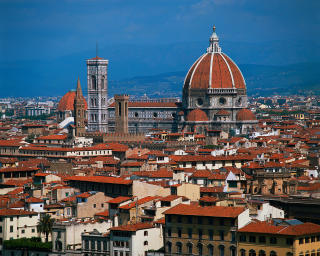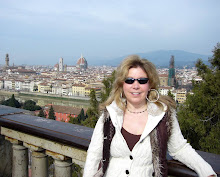

I decided to take it easy this weekend and get some lesson planning, laundry, house cleaning, and shopping done. I’ve been out and about far too much, and things have really been piling up. So Saturday afternoon I set out to run some errands: grocery shopping, recharging my cell phone, buying stamps, and so on. Never did I expect to stumble upon the beautiful little Chiesa di Santa Margherita, which is only a few blocks from my apartment. It’s funny; I’ve walked by this church numerous times but have never noticed it. Perhaps it’s because it’s so small and modest; I think that this was also the first time the doors had been opened. I entered.
The interior was dark; the only light came from candles near the altar. And although the church wasn’t lit, haunting classical music came from somewhere, adding an air of mystery. You knew immediately that silence and retrospection was required here. You might be wondering what makes this church so special. It is in front of this church that legend says is where Dante, who was born in Florence in May 1265, met his muse, Beatrice Portinari, when they were both just nine years old. Although they never married (he married a woman named Gemma through arrangement), his deep love of and adoration for her served to influence much of his future work, including The Divine Comedy.
Unfortunately, Beatrice, who married banker Simone de’ Bardi, died very young at the age of twenty-four, and she is buried in this church. On the walls of the church are frescoes that vividly show accounts of everyday life in fifteenth-century Florence, including the meeting of Dante and Beatrice. But the most poignant of all in this church is the grave of Beatrice. After all these centuries, people still pay their respects to this special woman, a woman who inspired some of the greatest writing the world has ever seen. The top of her marble tomb was covered with notes, cards, fresh flowers, and other tokens that people have left in memory of Beatrice. I found myself feeling rather heartbroken for Dante and Beatrice, for a love so powerful yet unfulfilled.
Beyond the sphere that makes the widest round,
passes the sigh arisen from my heart;
a new intelligence that Love in tears
endowed it with is urging it on high.
Once having reached the place of its desiring
it sees a lady held in reverence,
splendid in light; and through her radiance
the pilgrim spirit looks upon her being.
But when it tries to tell me what it saw,
I cannot understand the subtle words
it speaks to the sad heart that makes it speak.
I know it tells of that most gracious one,
for I often hear the name of Beatrice.
This much, at least, is clear to me, dear ladies.
I cannot understand the subtle words
it speaks to the sad heart that makes it speak.
I know it tells of that most gracious one,
for I often hear the name of Beatrice.
This much, at least, is clear to me, dear ladies.



No comments:
Post a Comment